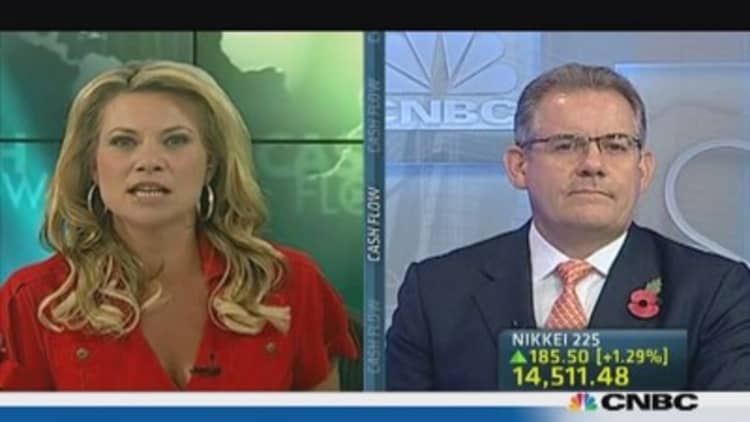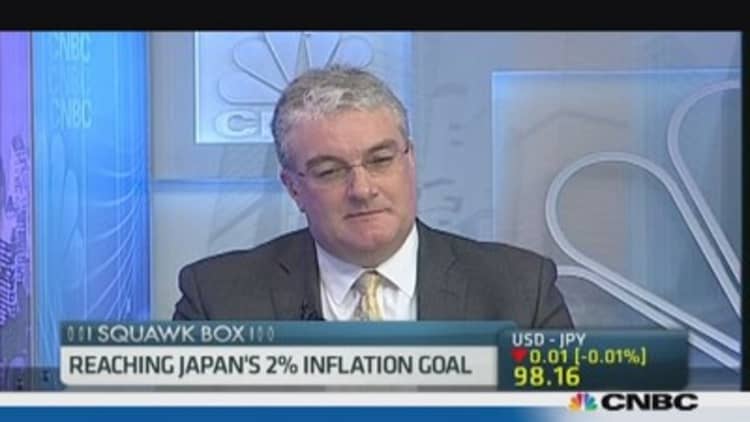Almost a year on from when Japanese Prime Minister Shinzo Abe voiced the need for radical change to kick-start Japan's moribund economy, analysts remain divided over the success of 'Abenomics.'
Some say the mix of aggressive monetary policy, fiscal stimulus and economic reform this year has ignited a buzz about the world's third-largest economy not seen for a long time. Just look at the Nikkei, which is up almost 40 percent this year to easily become the world's best performing stock market.
(Read more: Why Japan stocks may storm even higher even if yen firms)
Others however, argue that the move towards significant long-term reforms, on which the success of Abenomics is expected to rest, remains to be seen.
"Abenomics is at its first anniversary in effect and yet the only thing we've seen is the sales tax and that was looking hesitant for a while," said Andrew Sullivan, director of Asian sales trading at Kim Eng Securities. He was referring to Abe's decision in early October to push ahead with a controversial rise in Japan's sales tax, which is seen as key to easing the country's huge debt load.

"That is probably what has worried fund managers the most, the fact that there doesn't seem to be a strong will behind these policies," he added.
(Read more: Japan's Abe calls for cut in corporate tax)
Disappointment about the lack of detail from Abe on measures to put Japan's economy on a stronger footing long-term has been cited by strategists as one reason why a rally in the Nikkei has stalled and the yen has been unable to weaken significantly beyond the 100 level against the dollar.
Japan's blue-chip stock index is trading around 14,500 points – down 9 percent from a 5-1/2 year high hit in May. That's still up roughly 65 percent from where the Nikkei traded in early November 2012 when Shinzo Abe first started to talk about the need for radical economic policies before elections in December that saw him return to power as Japan's Prime Minister.
"The way I would look at Japan is that it is between a rock and a hard place," said Rob Aspin, head of equity investment strategy at Standard Chartered Bank Wealth Management Group.
"Either it reverts back to where things were before Abenomics kicked in, with deflation and a weak economy, or the BOJ [Bank of Japan] has to print significantly more money and become a buyer of last resort of JGBs [Japanese government bonds]," he added, saying that he holds a neutral position on Japanese stocks and is waiting for signs of further stimulus from the BOJ.
(Read more: Japan retail sales, household spending beat forecasts)

The BOJ said in April it would pump $70 billion into the economy each month to help push inflation up to 2 percent in two years. Japan's consumer price index, when food and oil prices are stripped out, was flat in September and that means the BOJ has room to step up monetary stimulus, analysts say.
Ed Rogers, CEO of Rogers Investment Advisors, which runs a Japan-focused fund, said the bottom line with Abenomics is to look at the cumulative impact of the economic policies.
Recent economic data certainly has painted a positive picture. Japanese retail sales rose 3.1 percent from a year earlier in September, while household spending logged a bigger-than expected 3.7 percent gain from a year earlier – signs that personal spending is supporting economic growth.
"Not everyone buys into Abenomics… but what matters is the cumulative effect," Rogers said.
"One of the most important things about the third arrow is confidence and looking back from a year ago there's absolutely no doubt that has improved," he added, citing Tokyo's successful bid to host the 2020 Olympic gains as one sign of improved confidence in Japan.
— By CNBC.com's Dhara Ranasinghe; Follow her on Twitter @DharaCNBC


